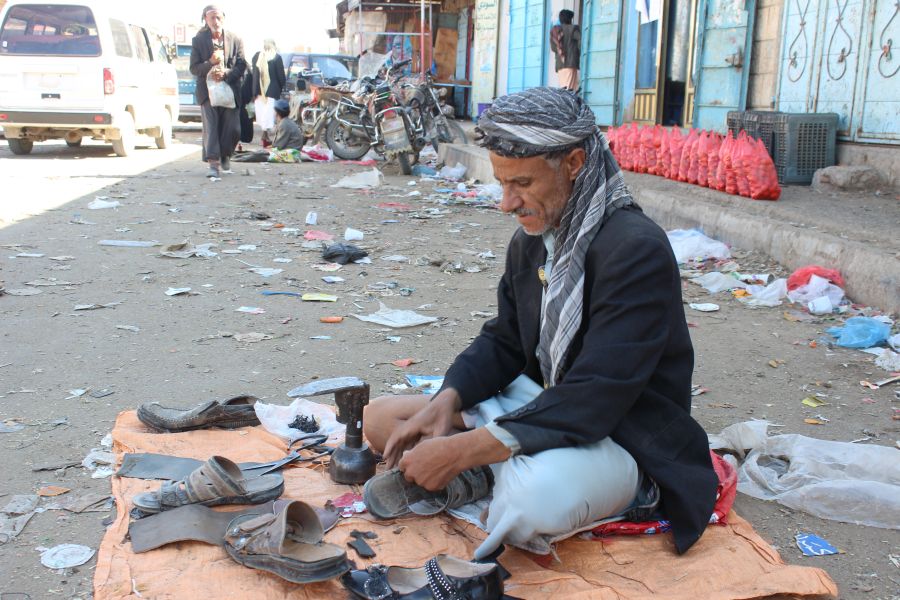
The conflict that escalated in March 2015 in Yemen has left more than 22 million people - 75 per cent of the population - in need of humanitarian aid, the greatest number in any country in the world.
More than 60 per cent of the population (17.8 million people) are without enough to eat. Over 8.4 million of these people are one step away from famine. About 16 million Yemenis do not have access to safe water sources, with rural areas most affected.
The economy has been shattered, food prices are on the rise and essential services like health and education are collapsing. Many people have lost their jobs and cannot afford basic items.
Their daily life is a struggle for survival.

Murad Hreib is a 22-year-old father of two. Before the war, he used to live and work in a shop in Saada city. He was forced to flee to Khamer city when the conflict escalated two years ago.
“When the war started, there was an air strike that targeted the military compound near our neighborhood. I was in the shop at the time, my wife and children got really scared! Even now, whenever they hear an aircraft, they start screaming, they think it will target them,” explains Murad.
He now works as motorcycle taxi driver and makes around 800-1000 Yemeni Riyals ($3-4) a day. The rent for the small house he lives in with his family costs 10,000 YER ($40) and without direct access to water, he also has to spend up to 5,000 YER ($20) on water per month.
“I drive my motorcycle all day and come back home exhausted. I have no regular source of income, I’m far from my home, friend and memories, and I’m just trying to survive,” he told us.
His family has received food vouchers and cash transfers from Oxfam which helped them to buy food for the children, but prices keep rising and he can now barely afford the essentials.

Ahmed Moqbeel, 45 and his wife Dolah Najee, 40, live in Khamer city, in Amran Governorate with their eight children. Ahmed works as a cobbler in the market. On good days, he manages to make 500 Yemeni Riyals ($2) a day, though he often comes back home empty-handed.
“Our life has always been difficult, but it got worse after the war. Food prices went up because of the fuel shortage. In the market, you can see how many people struggle to buy food for their children,” explains Dolah.
”Every month, we need to spend over 11,000 YER ($44) on flour, and all we can eat is bread and tea.” Sometimes Dolah goes begging at the market, or in the neighborhood asking for bread or money. “I can't stand it when my children are hungry, I feel helpless” she says.
Oxfam supported the family with food vouchers and cash transfers, which enabled them to buy food without getting into debt.

Aisha, 10 years old, carries a plastic container containing the clothes she just washed in the stream and holds another jerry can of drinking water. She lives in Bani Shaibah village, in Taiz governorate. Her father is jobless, and her mother works for a rich family in the village to earn money to buy food.
Aisha is unable to go to school because her family is poor and depends on her to wash the clothes and bring water from the wells, which are half an hour from her home.
The family belongs to a marginalized community suffering from racial discrimination in Yemen. Without any source of income, they solely depend on begging and humanitarian assistance to survive. The children cannot go to school as the family cannot afford the school fees and the required materials. They’re receiving support from Oxfam to be able to eat, as well as hygiene kits.

Kadafish Omar, a 62 year old widow, used to live in Saada, near the Saudi border, with her six daughters. She was displaced first time to Al-Mazraq IDPs camp in Haradh in 2008, where she stayed for six years. When the Saudi-led coalition bombed the camp in 2014, they were forced to flee to another camp in Hajjah governorate.
“I’m suffering from high blood pressure, but I can’t afford to go to a doctor. Eating bread and tea and no healthy food, is making my condition worse. My daughters are scared of the air strikes. They haven’t gone to school since we have been displaced.”
Kadafish is one of 45,000 people in Abs who received 24,500 Yemeni riyals in cash (around $100) from Oxfam to be able to buy food. “It’s been 8 years we have struggled for food. My daughters and I are trying to save the food we have for as long as possible until an organization gives us a food basket. But sometimes it’s only once in three months.”
Photos: Moayed Al-Shaibani y Abdulnasser Alhaj / Oxfam
Support our work in Yemen
Since July 2015 Oxfam has reached over 2.8 million people across Yemen with water and sanitation services, cash assistance and food vouchers.
We urgently need to reach more people and we can’t do it without you.
